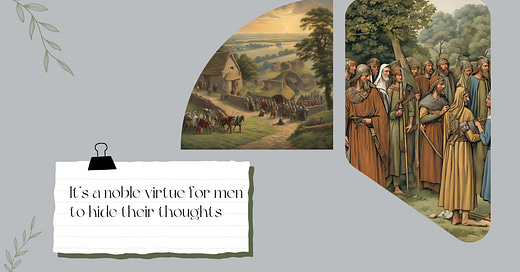It's a noble virtue for men to hide their thoughts
The acceptability of public displays of grief in 'The Wanderer', an Anglo-Saxon poem
A series sharing Anglo-Saxon poetry, with the hope of revealing the untold lives and tales within them: the shared experiences we have with their emotions as they journeyed through lives over a thousand years ago.
Click here to check out previous posts in this series!
This post takes a brief look at the theme of grief and heartbreak in the Anglo-Saxon poem The Wanderer. Much ink has been spilled over the contents and structure of this poem, and there is so much that could be pulled out of it. For this short post, we’re going to focus just on the poet’s presentation of his own emotional response to the loss of his lord and the many men around him who have fallen victim to ‘hardships and cruel wars and the deaths of kinsmen’ (tr. Hamer 1982: 179).

As I was reading The Wanderer, I found myself drawn to the words and phrases that the poet used to describe grief:
The heart’s wounds seem that yet heavier, Grief for the dear one gone; sorrow returns When the mind fills with memories of kinsmen And greets them gladly, contemplates them keenly. But his old friends swim frequently away, The floating spirits bring him all too few Of the old well-known songs. tr. Hamer (2015: 181)
The poet goes on to argue for the acceptability of displaying one’s grief, suggesting that this was not the norm in pre-Conquest England:
I do not see why in this world My heart should not grow dark, when I consider The lives of warriors, how they suddenly Have left their hall, the bold and noble thanes. tr. Hamer (2015: 181)
An earlier section of the poem adds further weight to my suspicion that men at this time were advised to keep their feelings under wraps:
Frequently I have had to mourn alone My cares each morning; there is now no man Alive to whom I dare to reveal my heart Openly, and I know it for a truth That in a man it is a noble virtue To hide his thoughts, lock up his private feelings, However he may feel. tr. Hamer (2015: 179)
I noted this theme of male heartbreak when writing on another Anglo-Saxon poem The Wife’s Lament. There, the poet notes that men were expected to keep a stiff upper lip, as it were, to keep their sadness hidden beneath a veneer of cheerfulness:
Young men must always be serious in mind and stout-hearted; they must hide their heartaches, that host of constant sorrows, behind a smiling face. tr. Kevin Crossley-Holland (1982: 57).
Yet it strikes me that it seems to have been acceptable for men’s feelings to be poured into poetry. Men were clearly feeling these feelings, just as they do today, and I am grateful for their preservation in poetry such as The Wanderer and The Wife’s Lament. These words create a visceral connection between us and the people of the past, reminding us that they were people with textured lives just as we have today: real loves, real losses, real grief.
I’ve also written about public displays of grief (by men) in Beowulf: for some reason, it was appropriate there for the very pinnacle of the social hierarchy to engage in funerary rituals that involved chanting and wailing - not exactly keeping their feelings under wraps...
Might this have been something to do with the emotion’s location within a funeral?
Here possessions are fleeting, here friends are fleeting,
here man is fleeting, here kinsman is fleeting,
the whole world becomes a wilderness.
tr. Crossley-Holland (1982: 52)What are your thoughts as you read these excerpts from The Wanderer? Are there any poems exploring similar themes that you have been captivated by, either from history or the present? Share them in the comments below!
Are you new here? Check out my welcome post below to find out more about me and what you can expect here on Telling Their Tales.
Telling Their Tales - What's it all about?
Hi there, I’m Holly. Welcome! I’m currently a full-time stay-at-home-mum, having welcomed our little one in May 2023, and I pursue my love for reading and writing history in the edges of motherhood (read: during nap times). Motherhood has changed me entirely in more ways than I have words to describe here, but one of the best is that I’ve been able to sp…








@John Paul Davis thanks for the restack 🤩